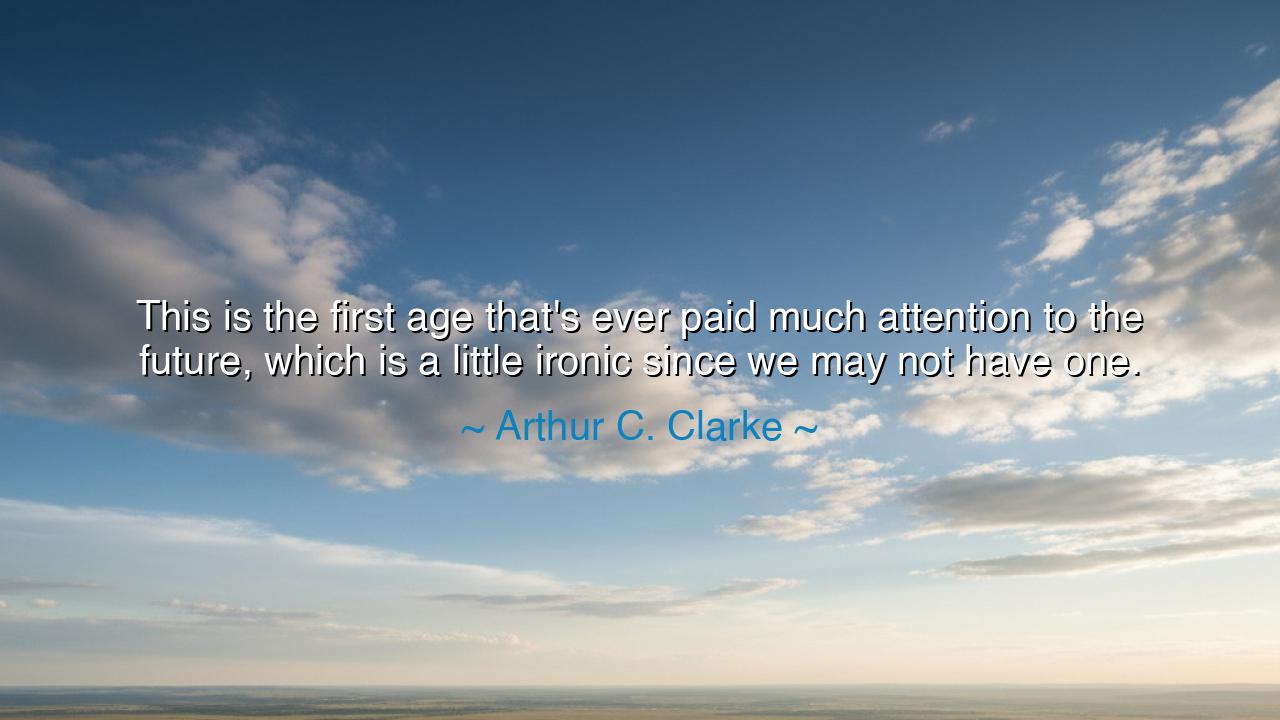
This is the first age that's ever paid much attention to the
This is the first age that's ever paid much attention to the future, which is a little ironic since we may not have one.






In the eternal dance of time, the human race has often lived in the present, looking no further than the next season, the next harvest, or the immediate needs of survival. Yet, with the rise of technology, science, and the age of reason, a profound shift has occurred. The words of the great Arthur C. Clarke echo across time: “This is the first age that's ever paid much attention to the future, which is a little ironic since we may not have one.” These words reflect both the brilliance and the tragic irony of our age—a time when humanity is more focused on planning, progress, and control, yet may face the very real possibility that the future we are shaping may not come to fruition at all. Clarke's words challenge us to reflect not only on our incredible achievements but on our failure to recognize the fragility of the very world we have built.
The future—that mysterious, ever-elusive concept—has captured the human imagination for centuries. The ancients often envisioned the future through myth and prophecy, looking to the gods for guidance. In Greek mythology, the figure of Prometheus is a symbol of the eternal quest to understand the future. His gift of fire to humanity represents the light of knowledge that illuminates our path forward. Yet, in his defiance of the gods, Prometheus also represents the danger of hubris—of believing that humanity can control its own destiny, without regard for the forces of nature, time, or divine will. Just as Prometheus gave fire to humanity, so too have we harnessed the powers of science and technology. But the tragedy lies in the irony that, despite our great knowledge, we may still be blind to the consequences of our actions—our environmental destruction, our unchecked growth, and the possibility that the very future we plan for may be beyond our reach.
Clarke’s statement is particularly poignant when considered against the backdrop of modern history. The 20th century, with its rapid technological advancements, marked the first time in human history that we have genuinely turned our gaze toward the future. Nuclear weapons, space exploration, the advent of the Internet, and the manipulation of genetics all point to a generation obsessed with shaping what lies ahead. Yet, at the same time, we find ourselves on the precipice of catastrophic risk—whether through climate change, the potential for nuclear war, or the unchecked rise of inequality and political instability. Just as Clarke notes, there is irony in our collective ambition to secure the future, even as we undermine it with actions that threaten our very existence.
The ancient Romans, with their wisdom and their pragmatism, believed that the key to a prosperous future lay in the virtues of the present. In their minds, a focus on duty, wisdom, and temperance could ensure the well-being of both the present and future generations. Yet, even they were not immune to the temptations of power and empire, and their imperial hubris—the belief that their dominance could last forever—led to their downfall. The story of Rome’s decline is a reminder that no matter how advanced or powerful a civilization becomes, it is vulnerable to the forces it cannot control. The lesson here is that the future is not something we can dominate with knowledge alone, but something that requires careful stewardship, humility, and an understanding of the delicate balance between progress and sustainability.
Let us also consider the story of Leonardo da Vinci, a man who spent much of his life imagining the future. His notebooks are filled with designs for machines, flying devices, and visions of a world far beyond his time. Yet, despite his genius, Leonardo faced the same irony that Clarke speaks of: the future he envisioned, while brilliant, could not be realized in his own lifetime. Like Leonardo, we too are visionaries, imagining a world shaped by technology and innovation, but we must remember that the power we wield comes with consequences. Just as Leonardo’s creations were not meant for his time, so too the technologies we build today may have unintended consequences that we will not fully comprehend until it is too late.
The lesson in Clarke’s words is one of humility and reflection. Our obsession with the future, while driven by our desire for progress, must be tempered by the understanding that time is not something we can control. The future is fragile, shaped by the choices we make today. Clarke’s irony is a warning that we must not simply race forward into the future with blind optimism, but we must pause and consider the long-term consequences of our actions. Just as the ancient sages urged their followers to act with wisdom and to respect the balance of nature, we too must learn to live with a sense of responsibility for the world we are leaving behind.
In our own lives, we must apply this wisdom. While it is natural to plan for the future, we must also be mindful of the present. Let us strive not only to create a future of progress but to build one that is sustainable, compassionate, and respectful of the environment and the world around us. Let us learn from the ancients, from Leonardo, and from Clarke that the future is not a guarantee—it is a responsibility, one that we must approach with care, humility, and a deep understanding of our place within the larger story of humanity. And as we look to the future, let us never forget that it is the choices we make today that will shape the world our descendants inherit.






AAdministratorAdministrator
Welcome, honored guests. Please leave a comment, we will respond soon